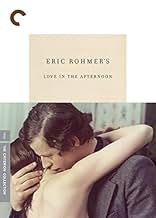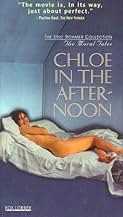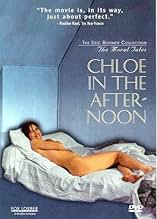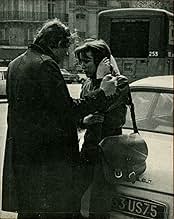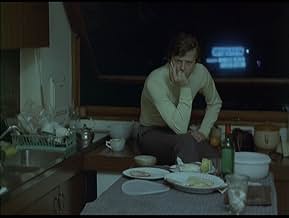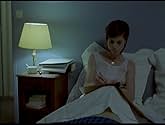Embora tenha uma esposa adorável, o burguês ainda se sente tentado a perseguir outras mulheres.Embora tenha uma esposa adorável, o burguês ainda se sente tentado a perseguir outras mulheres.Embora tenha uma esposa adorável, o burguês ainda se sente tentado a perseguir outras mulheres.
- Direção
- Roteirista
- Artistas
- Prêmios
- 1 vitória no total
- Martine
- (as Babette Ferrier)
Avaliações em destaque
Like other movies from Rohmer, "L'Amour l'après-midi" is presented like a book. It's a great combination of cinematic and literary experience.
Out of 100, I give it 84. That's good for *** out of ****.
Seen at home, in Toronto, on November 18th, 2002.
I was particularly taken with the scene on the train when Frederic begins to explain how he is able to remain under control in the presence of so many beautiful women in the world. Simply acknowledging such beautiful creatures seems to be enough for this man, yet when Chloe arrives on the scene we begin to wonder if Frederic will fold under pressure.
I can surely identify with what Frederic feels on the train. It happens to all of us -- we are faced with beauty, and we must respond. How we respond is what makes life worth living.
All of the "Six Moral Tales" provide the viewer with a cast of excellent and memorable characters. Even if these characters aren't always the most likable (just look at the film "La collectionneuse"), they are always very interesting to watch. I believe that the characters in "Chloe in the Afternoon" may be the greatest characters in the "Six Moral Tales" series. Especially the character of Chloe, a very smart and likable character who offers a lot of the film's greatest and most interesting dialogue (great dialogue is another feature that is all over this film series).
Another thing that I found highly impressive about the way her character was written was how she is given a clear back story, but, instead of her back story being forcefully told to the audience in detail all at once it is simply glanced over. It is perhaps the least forced back story given to a character in any other film that I've seen.
The film also turns out to be the most emotional of the "Six Moral Tales", with a truly compelling ending sequence. You can tell that director Eric Rohmer's films really began to mature since the earliest of the "Moral Tales", the 1962 short film "The Bakery Girl of Monceau".
While it isn't the best of the "Six Moral Tales", and it was kind of slow at times, it is a perfectly fitting ending to one of the greatest of all film series!
Você sabia?
- CuriosidadesThis film is part of the Criterion Collection, spine #348.
- Erros de gravaçãoAt approximately 1:16 in the film, Chloe opens the store door wearing red shoes matching her dress. In the following scene, she walks down a staircase wearing black shoes which match her stockings.
- Citações
Frédéric: [voice over] That's why I love the city. People come into view, then vanish. You don't see them grow old. What makes the streets of Paris so fascinating is the constant yet fleeting presence of women whom I'm almost certain never to see again. It's enough that they're there, indifferent, conscious of their charm, happy to test its affect on me, as I test mine on them, by tacit agreement, without even the subtlest smile or glance. I feel their seductive power without giving in to it. This doesn't estrange me from Hélène. Far from it. I tell myself these passing beauties are simply an extension of my wife's beauty. They enrich her beauty and receive some of hers in return. She's the guarantee of the world's beauty and vice versa. When I embrace Hélène, I embrace all women.
- ConexõesFollows A Padeira do Bairro (1963)
Principais escolhas
Detalhes
Bilheteria
- Faturamento bruto mundial
- US$ 3.520
- Tempo de duração1 hora 37 minutos
- Mixagem de som
- Proporção
- 1.37 : 1
Contribua para esta página


![Assistir a Bande-annonce [OV]](https://m.media-amazon.com/images/M/MV5BNDVkYjA1MTItYWFjMi00ZTQ3LTg2NGQtZmZhOTg4MjU1MTg4XkEyXkFqcGdeQXRyYW5zY29kZS13b3JrZmxvdw@@._V1_QL75_UY281_CR5)
